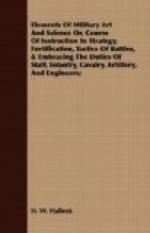Dr. Lieber’s remarks on this point are peculiarly just and apposite. “The continued efforts,” says he, “requisite for a nation to protect themselves against the ever-repeated attacks of a predatory foe, may be infinitely greater than the evils entailed by a single and energetic war, which forever secures peace from that side. Nor will it be denied, I suppose, that Niebuhr is right when he observes, that the advantage to Rome of having conquered Sicily, as to power and national vigor, was undeniable. But even if it were not so, are there no other advantages to be secured? No human mind is vast enough to comprehend in one glance, nor is any human life long enough to follow out consecutively, all the immeasurable blessings and the unspeakable good which have resolved to mankind from the ever-memorable victories of little Greece over the rolling masses of servile Asia, which were nigh sweeping over Europe like the high tides of a swollen sea, carrying its choking sand over all the germs of civilization, liberty, and taste, and nearly all that is good and noble. Think what we should have been had Europe become an Asiatic province, and the Eastern principles of power and stagnation should have become deeply infused into her population, so that no process ever after could have thrown it out again! Has no advantage resulted from the Hebrews declining any longer to be ground in the dust, and ultimately annihilated, at least mentally so, by stifling servitude, and the wars which followed their resolution? The Netherlands war of independence has had a penetrating and decided effect upon modern history, and, in the eye of all who value the most substantial parts and elementary ideas of modern and civil liberty, a highly advantageous one, both directly and through Great Britain. Wars have frequently been, in the hands of Providence, the means of disseminating civilization, if carried on by a civilized people—as in the case of Alexander, whose wars had a most decided effect upon the intercourse of men and extension of civilization—or of rousing and reuniting people who had fallen into lethargy, if attacked by less civilized and numerous hordes. Frequently we find in history that the ruder and victorious tribe is made to recover as it were civilization, already on the wane with a refined nation. Paradoxical as it may seem at first glance, it is, nevertheless, amply proved by history, that the closest contact and consequent exchange of thought and produce and enlargement of knowledge, between two otherwise severed nations, is frequently produced by war. War is a struggle, a state of suffering; but as such, at times, only that struggling process without which—in proportion to the good to be obtained, or, as would be a better expression for many cases, to the good that is to be borne—no great and essential good falls ever to the share of man. Suffering, merely as suffering, is not an evil. Our religion, philosophy, every day’s experience, prove it. No maternal rejoicing brightens up a mother’s eve without the anxiety of labor.”




